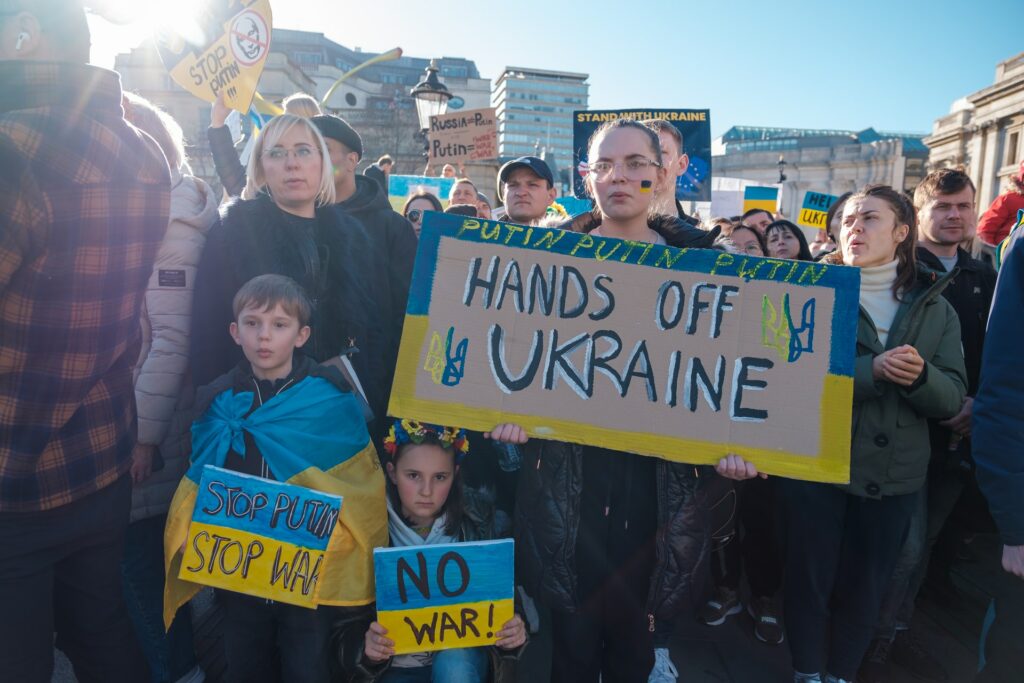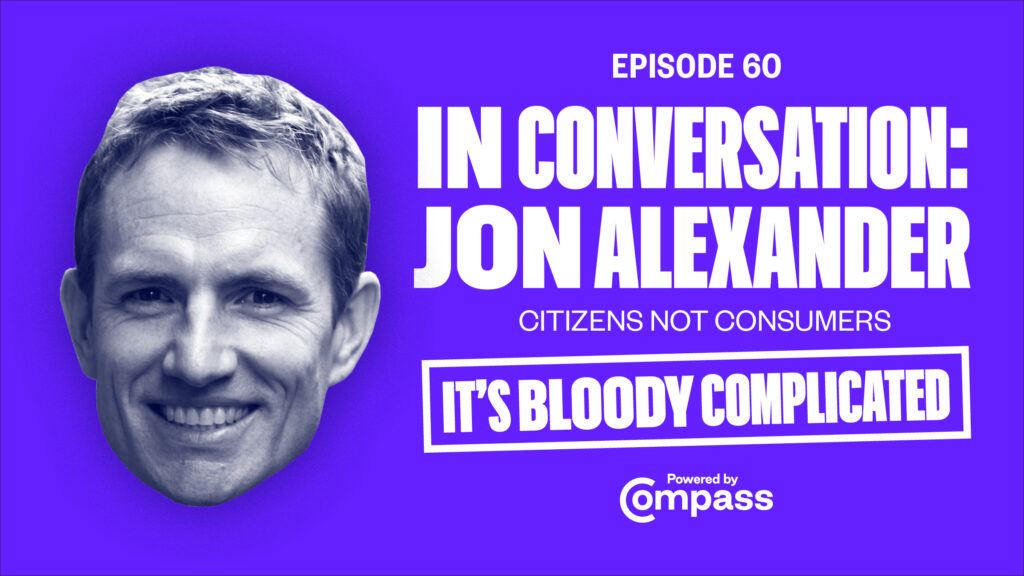
A few days ago I wrote a LinkedIn post offering a way of seeing the hope in this darkest time, through the lens of the three ‘deep stories’ I work with. In this piece, I’ll revisit that briefly, then go further, setting out some practical ideas for what our leaders might do if they were to see this hope, and step into it.
Vladimir Putin’s attack on Ukraine can be understood as a pure expression of the resurgence of the Subject Story, as in ‘subjects of the King’. In this story, Strong Man Leaders offer us protection from a dangerous world in return for our submission and obedience. We might have thought this story had been left behind in the colonial era – or at least after World War II – but it has been rising all over the world in recent years, and remains a major threat in the form of creeping authoritarianism in the UK, US, and many other places. Action from this logic says ‘Do what the leader says, and all will be well’.
The West’s sanction-led response comes from the Consumer Story, the story that has been dominant for the last 80 years, since we last reinvented the institutions of human society in the aftermath of World War II. In this story, we are homo economicus: rational creatures motivated by material self-interest. Trade is the route to peace, the role of the state to provide services rather than command obedience. Action from this logic says ‘pursue self-interest (which you want to anyway), and all will be well’.
I’ll come back to sanctions later… but for now it is enough to acknowledge that the true fightback, the hope that is almost too painful to name and could yet be crushed, is coming from a different story: what I call the Citizen Story. This story reflects a deeper truth of humanity. We are creative, collaborative, caring creatures. What we need is neither command, nor service, but agency. Action from this logic says ‘All of us are smarter than any of us – put meaningful power in people’s hands, and we will use it well’.
If we see the Subject Story in Putin, and the Consumer Story in sanctions, we can see the Citizen Story in the response of Zelenskyy and the Ukrainians, but also of the citizens of Russia, and indeed of the citizens of the world.
Look at the Ukrainians taking up arms regardless of experience, standing in front of tanks, carrying land mines out of the road. Look at Zelenskyy, joining the front line as an ordinary soldier. Look at his incredible speech appealing directly to the Russian people: ‘I come today with an appeal to all citizens of Russia. Not as President. I am appealing to the citizens of Russia as a citizen of Ukraine.’
Look at the 1,100,000 (and counting) Russian citizens who have signed a petition against the war, and the 6,000 (and counting) who have been arrested for protesting – numbers that look set to increase dramatically after Alexei Navalny, Russia’s leading opposition figure, called for protest for the first time in many months.
Look at the Anonymous Collective, declaring cyber war on Russia and swiftly taking Russia Today off air and .ru websites offline. Look at the members of The European Coworking Assembly helping Ukrainian members stay in touch with each other and the wider world through their network, organising help for people to escape and offering free working spaces so that people can continue to work remotely.
Look at the solidarity protests and sit ins all over the world, and the first international brigades starting to form and fly in.

What we see in all of this is our universal hunger for agency, for the power to help one another and build something better. Now – and this is the crucial point – ask yourself this: what if the leaders of ‘the West’ saw this story, stepped into it, and opened it up for us? What would that look like?
Here are a few practical thought starters…
- What if Ursula von der Leyen made a film addressing the Russian people directly, just as Zelenskyy did, making an offer of friendship and addressing Putin’s misinformation as fellow citizens of the world? What if she went one step further than Zelenskyy, crowdsourcing the content for such a film – messages of friendship and fellowship to the Russian people, blaming Putin not them – from the people of Europe?
- What if the UN or the EU reached out to Anonymous or the European Co-working Assembly and offered support for their efforts, asking them what they might need to do more?
- What if Sadiq Khan collaborated with Transparency International and expert voices like Oliver Bullough to run a Citizens Assembly or deliberative polling exercise to refine their recommendations into a ‘People’s Plan’ to clean up London’s role in Russian financial crime, and then made the resulting demands of central government, with the backing and ownership of London’s citizens?
- What if the EU or Germany – or indeed the UK – ran a participatory democracy process on reducing gas consumption, maybe using the software Taiwan uses to crowdsource policy?
- What if, as a very basic starting point, our national leaders could simply address us directly, celebrate what we are already doing, and say ‘we are all in this, and it could get harder – keep giving what you can, keep using less gas if you can, keep protesting where you can, keep doing what you can, and being together as much as you can – it all matters’?
Stepping back, the big truth is that the Consumer Story is broken. It was supposed to set us free, and relative to the Subject Story that preceded it, perhaps it did. But now its logic demands that our every move be monitored and monetised, and we risk becoming less truly free than we have ever been. It was supposed to solve poverty, but its demand that we compete to hoard more has created pervasive extreme inequality, and its endorsement of individual greed has created the perfect conditions for the pervasive influence of Putin’s oligarchs. It was supposed to save the planet, but ever-expanding material consumption is the story’s lifeblood, and has kept us addicted to the fossil fuels that prop up these regimes; it is and always has been inherently unsustainable.
Our society is collapsing because the story we use to make sense of ourselves is collapsing. As a response from that story, sanctions do have an important role to play in this time, particularly those that directly target the few who directly support Putin, and do so as tightly as possible. But even at best they will not be enough, and seeing this situation through the lens of these stories can help us see that, at worst, too much broader economic pressure on the Russian people could actually help Putin, giving him the ability to reinforce his Subject Story and position himself as the Great Protector against the aggression of the West.
By contrast, as Citizens, there is so much we are doing already, and what we are doing is not only defending Ukraine, but also showing another way we can be in the next phase of society. It might be that none of the ideas above are right in the specifics – but what they all speak to is a principle of involvement that I believe is fundamental to the leadership we need now. We do not need Strong Men to protect us. We do not need to be served. We need to be involved. If our leaders can see this, we could create something very special out of this time, together.
Jon Alexander is Co-Founder and Director of the New Citizenship Project. His new book, CITIZENS: Why the Key to Fixing Everything is All of Us, is available now.
This piece was originally published by Jon Alexander as part of a series of posts and articles asking ‘What if we were #CitizensNotConsumers?’
Check out the latest episode of It’s Bloody Complicated, the Compass podcast, to hear more on citizen responses to the crisis in Ukraine.

Spot on! I am with you! How best?